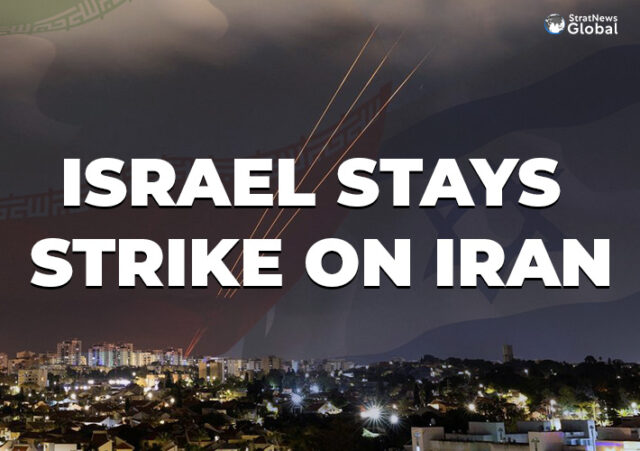“They want to tell Iran that they will really strike back. But I don’t see that happening anytime soon. And the reason is the reservations that the American administration has against retaliation at the moment. America has said in very clear terms that it will not join any counter attack on Iran.”
Khinvraj Jangid is a visiting faculty at Israel’s Ben Gurion University of the Negev in Tel Aviv. Speaking on StratNews Global, he said “The US did extremely well in defending and assisting Israel to shut down the drones and the missiles. So also France and the UK. So the three major Western allies of Israel don’t want a counter attack on Iran.”
Jangid believes that there is today a “greater sense of assurance” within Israel about the Iranian threat. Israel has lived with this anxiety for the last six months. When will they attack? When will Hezbollah attack? Will it become a regional war? Will they see greater tragedy befalling upon them since October 7th last year. But post the mass drone strike on Sunday, there’s a new confidence visible.
“I slept well that night,” recalled Jangid, “because there was no siren. It was only in the morning when I saw the ton of messages on the phone and opened the papers that I realised Iran had finally attacked.”
But Israel, as US President Joe Biden said, had defended itself “in an impeccable manner”.
Iran on the other hand, is in a psychological war with Israel. Jangid pointed to Iranian leaders who tend to speak in a very threatening manner against Israel. However, Iran itself is not in a very strong position. There was a lot of internal debate within Iranian state where the regime had to worry about its own legitimacy and whether it could get dragged into a war with Israel.
“The regime itself doesn’t enjoy popular support,” says Jangid. “It enjoys power right now because it has a very strong police to control dissenters. We have seen over the last five, six years there are major events against the regime. So I think not dragging the country into a war is something they they needed to ensure.”
Where does Israel stand after the October 7th attack? Very defeated militarily, psychologically and politically because Hamas is not defeated. The hostages have not been rescued. Remember the Israeli army went in for five months and couldn’t find Yahya Sinwar, who is supposed to be hiding in the tunnels. Two months back, the Israeli army reached a tunnel and mapped how he escaped. Many in awe of Israel’s military and intelligence capabilities are also stunned at the sheer amount of failure.
“So I think militarily, Israel has reached nowhere. or literally Israeli leaders have really alienated some of its strong supporters in the world, including, S Jaishankar and he said, well, Israel should have been very mindful of the civilian casualties. And he added, the two state solution is all the more important and urgent.”
Is this about Netanyahu? Jangid argues that from day one Netanyahu had this hardline position not because of his other coalition partners “but probably because he himself believes in a very Machiavellian, Hobbesian hard power, realpolitik. But he underestimated Hamas and over relied on the Israeli military, underestimating Hamas ability to cope with an attack on Gaza. So the military operation did not succeed and I think that’s a big setback for his logic.”
Israel enjoys a very unique relationship with America. They call it unbreakable but they also have a terrible amount of conflict. They go through many fundamental disagreements. However, the fact that America stands behind Israel is undisputed. The problem for long is with a Democratic president and Netanyahu gave a lot of headaches to Bill Clinton in 1996 when he wanted to continue with the Oslo peace process. Then Barack Obama struggled hard to convince Netanyahu for the two state solution, it did’t work. In fact, they fell apart on the question of Iran’s nuclear program with Obama signing this ‘slowing down deal’ with Iran rather than confronting and attacking Iran or sanctioning it.
Netanyahu didn’t like that at all. He went against all protocols, sided with the Republicans who invited him to the Senate. He had just the joint session where he spoke against President Obama. It was unprecedented. Joe Biden, who was Obama’s vice-president, didn’t invite him to the white House when he became president. But after Oct 7, Biden was in Israel three days later.
“It was a very strong gesture,” says Jangid, “he really attended to the trauma and the anxieties of the Israeli state and the people.”
Netanyahu claimed they had a date to hit Rafah in Gaza, but the Americans checked and asked the defense minister who they trust more. He said we don’t have a date, which tells you that the Americans are working more with the defense minister than the prime minister of Israel. Civil society and the media, everybody really wants to be free of Netanyahu but his coalition partners are behind him. They are more hardline than Netanyahu. They know they will not return to power if elections happen.
The bombshell of course is two negotiators working to free the hostages, who said they could have got the hostages back two months ago had it not been for Netanyahu. They directly accused him of not giving priority to the hostages. The ex-head of Shin Bet and Mossad who served under Netanyahu for five years, said they would not get any of the hostages back. They will hardly recover from October 7th unless they change the government.
As for the counter attack on Iran, Jangid believes while it has escaped one for now, it has strategically blundered. The attacks have strengthened Israel by ending its isolation, for now. People have often accused Israel of exaggerating its existential anxieties. The Iranian attack really came at a very, very delicate time. So I think it helped Israel come out of the position of an aggressor, which is how the world saw it in Gaza.
Thirty eight years in journalism, widely travelled, history buff with a preference for Old Monk Rum. Current interest/focus spans China, Technology and Trade. Recent reads: Steven Colls Directorate S and Alexander Frater's Chasing the Monsoon. Netflix/Prime video junkie. Loves animal videos on Facebook. Reluctant tweeter.





